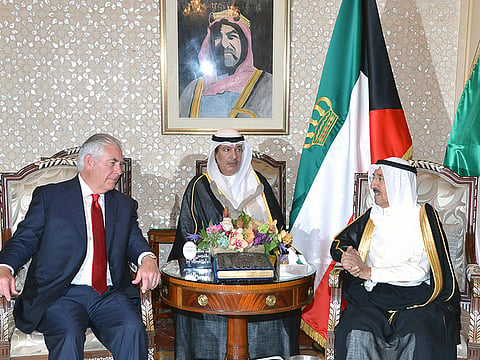Kuwait does what it does best — mediation
Track record of mediation began before Kuwait’s independence in 1961

Abu Dhabi: Shortly after the current Qatar crisis erupted on June 5, Kuwait stepped in to mediate between the two sides, an effort supported by the Gulf Cooperation Council (GCC) members as well as international players. The Kuwaiti mediation draws from a long history of successful intervention in dozens of conflicts across the Arab and Muslim regions, analysts say.
Dr Abdul Hadi Al Ajmi, chairman of the history department at Kuwait University, said across the region, Kuwait’s Emir Shaikh Sabah Al Ahmad Al Jaber Al Sabah is a respected mediator seen as the leader with the best chances of negotiating a settlement to the ongoing Qatar rift, given his long-time service as Kuwait’s deputy prime minister and foreign minister (1965-2003) and prime minister (2003-2006).
Dr Al Ajmi told Gulf News that Kuwait has been a respected peacemaker even before it became independent in 1961.
“In 1938, Kuwait’s then Emir, Shaikh Ahmad Al Jaber Al Sabah (1885-1950), who was the 10th ruler of Kuwait, from 1921 until his death in 1950, mediated between Qatar and Bahrain, which were engulfed in territorial disputes over the Hawar Islands since 1936. The disputes were resolved by the International Court of Justice in 2001,” Dr Al Ajmi said.
Dr Al Ajmi added Kuwait also played a key role in the negotiations to set up the UAE Federation in 1971 and the establishment of the Gulf Cooperation Council in Abu Dhabi in 1981.
“In 1968, Kuwait’s good offices played a major role in bringing about a peaceful settlement to the struggle between Saudi Arabia and Egypt, who supported warring factions in Yemen,” he said.
Dr Al Ajmi added Kuwait also mediated between North Yemen and South Yemen in 1972, acted as a go-between Saudi Arabia and Libya in 1982 and mediated a settlement to the Oman-Yemen crisis in 1984.
International support
Dr Fayez Al Nashwan, professor of international relations at Kuwait University, said during the 1991 Gulf War, Shaikh Sabah Al Ahmad Al Sabah, then Kuwait’s deputy prime minister and foreign minister, had demonstrated his diplomatic clout by orchestrating Kuwait’s policy, garnering international support and building up coalition forces from 35 nations led by the United States to free his country from the Iraqi invasion.
Dr Al Nashwan said the bitter experience of the Iraqi invasion led Kuwait to maintain relatively normal relations with Iran — as a bulwark and a counter-balancing power against Iraq.
“Therefore, Kuwait prides itself on serving as a peacemaker between Saudi Arabia and other GCC member countries, on the one hand, and Tehran, on the other hand,” Dr Al Nashwan said.
Once the Qatar row erupted, Kuwait quickly offered itself as a mediator with the Emir engaging in shuttle diplomacy that took him to Riyadh, Abu Dhabi and Doha.
As a veteran mediator, Shaikh Sabah received support from a host of countries including the US, the UK, France and Germany, besides the countries involved in the Qatar row.
In 2014, Shaikh Sabah played a vital role in efforts to resolve a rather less challenging intra-Gulf rift, during which envoys of Saudi Arabia, the UAE and Bahrain were summoned from Doha.
The Emir actively pursued and led rounds of negotiations that culminated in the return of Arab ambassadors to Qatar’s capital and to a more public signal at the GCC Summit that differences had been overcome. Today, Shaikh Sabah faces many similar issues of contention.
In the latest rift, he has again shuttled between Gulf capitals. He is more than a mere intermediary — rather, he can leverage Arab and Gulf-based cultural, religious, and identity norms of appeal that resonate with all sides.
Vesting interests in defusing the Qatar crisis, Kuwait seeks to enhance its status in the region and across the world as an international peacemaker that contributes to bringing about settlements of conflicts in the region.
Dr Al Nashwan said Kuwaiti Emir Shaikh Sabah also brokered Egypt’s disputed transfer of the Red Sea Tiran and Sanafir islands to Saudi Arabia.
Dr Fahd Al Shelaimi, a leading Kuwaiti analyst, said Kuwait has a track record of mediation diplomacy. During its “era of golden diplomacy” in the 1960s to the 1980s, Kuwait played a key role in regional politics punching above its weight and acting as a go-between in many crises: between Pakistan and Bangladesh and between Turkey and Bulgaria over their row over Bulgaria’s ethnic Turkish minority.
“Moreover, Kuwait played a mediator’s role between Bangladesh and Pakistan which led to mutual recognition between the two countries and opened the door for Bangladesh to participate in the 1974 Organisation of the Islamic Conference Summit in Lahore, Pakistan,” he said.
Dr Al Shelaimi, chairman of the Gulf Forum for Peace and Security, added Kuwait took other mediation tasks like leading Arab arbitration efforts among Lebanese factions.
He said Kuwait mediated between the Palestinians and Jordanians and had an initiative to end the civil war in Lebanon. “Kuwait was also the launching pad for the Palestine Liberation Organisation (PLO),” Dr Al Shelaimi said.
Dr Al Shelaimi added Kuwait’s mediation between the three Gulf countries and Egypt, on the one hand, and Qatar, on the other hand, reminds one of those good old days when it played a key role in regional politics and had a benign intervention diplomacy led by the current Emir, Shaikh Sabah — who was the world’s longest serving foreign minister having spent over 40 years as the top Kuwaiti diplomat — and thus earned deservedly the coveted title of “dean of diplomats”.


